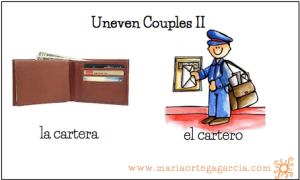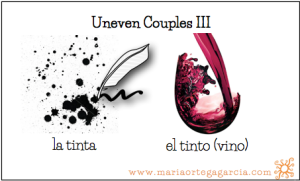As you all know, all nouns in Spanish have a genre, they are masculine or feminine. The main trait to distinguish if a word is masculine or female is by the ending. If the word ends by -o is masculine and if it ends by -a is feminine, although there are quite a few exceptions to this rule and other possible endings.
What I am going to focus in this post is about the regular pair of words that end in “o” and “a”, and the big change that “o” and an “a” make in terms of meaning.
Foco ≠ Foca
“El foco” is a ‘spotlight’ or a ‘torch’ which has nothing to do with “la foca“, that cute marine mammal, a ‘seal’.
Cigarra ≠ Cigarro
“La cigarra” is the lazy insect of the Aesop fable called ‘cicada’, whereas “el cigarro” is a cigarette.
Cartera ≠ Cartero
“La cartera” is a wallet and “el cartero” is the profession of that man that always calls twice, the postman.
Puerta ≠ Puerto
“La puerta” means the ‘door’, whereas que “el puerto” is a ‘port’, a ‘harbour’.
Caña ≠ Caño
“La caña” has multiple meanings, from a ‘cane’, to a ‘rod’ (caña de pescar) and the very important ‘small draft beer’ that this teacher loves so much: “¡Una caña, por favor!“. These meanings have no connection whatsoever with “el caño“, that means a ‘pipe’, or ‘waterpipe’.
Tinta ≠ Tinto
Ok, here both are liquids but not of the same kind. “La tinta” means ‘ink’ and “el tinto” is that wonderful red beverage, red wine, that is.
Marca ≠ Marco
“La marca” means a ‘brand’, whereas “el marco” is a ‘frame’.
Palo ≠ Pala
“El palo” is a stick and “la pala” is a ‘shovel’.
Bala ≠ Bolo
“La bala” is a ‘bullet’ whereas que “el bolo” is a ‘bowling pin’.
There are other “uneven couple” of Spanish words that means completely different things depending on whether they are masculine or feminine. So, don’t forget to check out the gender!


